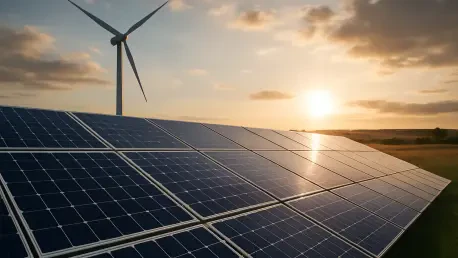In a world increasingly focused on sustainable development and self-reliance, Botswana stands out as a nation taking bold steps to secure its energy future and stimulate economic progress. Under the leadership of President Duma Boko, the country is embarking on a transformative journey to address pressing energy demands, reduce dependency on imported power, and create an attractive environment for investors. This ambitious vision, recently articulated in a state of the nation address, underscores a strategic blend of renewable energy expansion, infrastructure modernization, and economic reforms. As global markets shift toward sustainability, Botswana’s efforts to balance growth with environmental responsibility offer a compelling case study in navigating the challenges of energy security and economic vitality in a rapidly changing landscape.
Energy Security Through Power Generation
Scaling Up Renewable Energy Initiatives
Botswana is making significant strides in renewable energy to meet its growing electricity needs and reduce reliance on imports. With a peak demand of 700 megawatts (MW) and a nominal demand of 450 MW, the nation currently generates only 65 to 70 percent of its power locally. To bridge this gap, an impressive lineup of solar photovoltaic (PV) projects totaling 900 MW is underway in regions like Maun, Letlhakane, and Isang. Over 100 MW of this capacity is expected to connect to the grid by the end of this year, marking a pivotal step toward energy independence. This focus on solar not only addresses domestic needs but also positions Botswana to potentially export clean energy in the future, aligning with global trends toward renewable sources. The government’s commitment to these initiatives highlights a forward-thinking approach to harnessing natural resources for sustainable power solutions.
Boosting Thermal Power Capacity
In tandem with renewable efforts, thermal power generation remains a cornerstone of Botswana’s energy strategy to ensure reliability. The Morupule B Power Station, a key facility, currently operates three of its four 600 MW units, with the final unit slated for completion by the end of this year. Combined with the 120 MW output from Morupule A, local thermal generation is projected to reach 720 MW, surpassing peak demand and bolstering energy security. Additionally, a new 600 MW thermal plant at Mmamabula is under development, with completion targeted for late 2027. These projects demonstrate a balanced approach, ensuring a stable power supply during the transition to renewables while addressing immediate energy needs. This dual focus on thermal and solar power underscores a pragmatic plan to build resilience against supply disruptions and external dependencies.
Infrastructure and Economic Reforms
Modernizing Transmission and Fuel Reserves
Infrastructure upgrades are critical to Botswana’s vision of energy self-sufficiency and regional connectivity. The North West Transmission Grid Phase 2 project is a prime example, aimed at enhancing electricity delivery to northwestern areas and enabling export capabilities. Beyond electricity, securing fuel supplies is equally vital, with Botswana Oil Limited expanding strategic petroleum reserves from 15 to 90 days. The Francistown Petroleum Depot, nearing completion at 88 percent, will increase capacity from 38 million to 98 million liters, while the Gantsi Depot, at 55 percent progress, is expected to be operational by mid-2026. These developments reflect a comprehensive strategy to safeguard energy resources across multiple fronts. Moreover, Botswana’s application to the I-Track Foundation to issue International Renewable Energy Certificates (I-RECs) signals an intent to tap into global markets, creating new revenue streams for developers and attracting sustainability-focused investors.
Fostering Investment and Economic Inclusion
Economic reforms and investment incentives form the backbone of Botswana’s growth agenda, complementing energy initiatives. The establishment of Special Economic Zones (SEZs) is poised to drive export growth and job creation, with projects like a 100 MW solar plant near Matsiloje, valued at 1 billion Pula, expected to create 600 construction jobs and 30 permanent roles. Additionally, a $50 million Radisson Hotel project is set to begin construction in early 2026, while partnerships with international firms like CCI Global highlight Botswana’s rising appeal as an investment hub. On the financial front, the National Retail Payment Switch (NRPS), overseen by the Bank of Botswana, is advancing with full implementation targeted within the next 12 months to enhance payment transparency and reduce losses. Streamlined regulations and land development initiatives further signal a business-friendly environment, positioning the country as a regional leader in sustainable economic progress.
Reflecting on Strategic Milestones
Looking back, Botswana’s journey under President Boko’s guidance reveals a determined push toward energy autonomy and economic strength through a multifaceted strategy. The expansion of solar and thermal power capacities tackles immediate demands while laying the groundwork for future exports. Infrastructure projects, from transmission grids to fuel depots, fortify national stability, while economic reforms through SEZs and payment systems attract global interest. Moving forward, the focus should remain on sustaining this momentum by ensuring timely project completion and fostering international collaborations. Exploring innovative financing models for renewable energy and deepening regional partnerships could further amplify these efforts. As Botswana navigated these challenges in the past, the emphasis now lies in leveraging these achievements to inspire confidence among stakeholders and solidify its standing as a beacon of sustainable development in the region.









